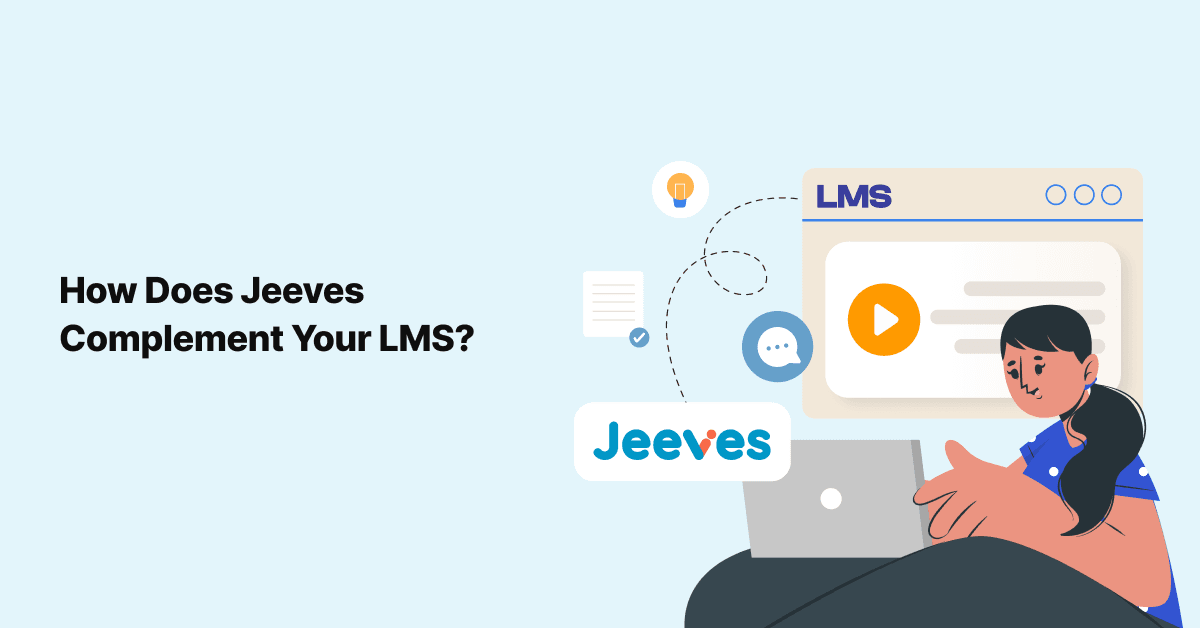
Calculating your Training Return on Investment
Return on investment (ROI) is one of the most important metrics for any business especially if they are …

The LMS, or Learning Management System, is one of the go-to solutions for training in many hospitals. Its ability to assign training and track training is a critical necessity in the learning ecosystem. However, it isn’t much of a help when it comes to providing holistic solutions for EHR learning. In order to achieve higher EHR satisfaction, strong contextual ongoing learning is necessary. This is where an instant in application support tool like Jeeves comes into play. The instant application support tool and LMS work together to create a solution throughout the training life cycle. Through this article, you will get to know how Jeeves can complement your hospital’s LMS system and make the most out of your learning strategy.
Through this blog, you’ll be able to explore:
An LMS or Learning Management System refers to a software application that tracks, houses, and delivers courses of formalized training to employees. The main objective of an LMS is to simplify the process of administering professional training and development. The goals of an LMS include:
Learning Management Systems were designed specifically for identifying learning and training completions through the use of analytical and data reporting. Without LMS, organizations can end up struggling in terms of delivering formal, standardized training courses as well as tracking progress reports. This can cause inefficiencies within the organizational workflow.
An LMS is primarily focused on delivering online learning content, but it also supports a range of other uses. In the higher education environment, LMS can offer flipped classrooms or classroom management for training that is instruction-led. The primary benefits that a Learning Management System provides are as follows:
With LMS, one can get reporting tools that can clue the users into places where improvement is required in the curriculum and where the employees are currently standing. It also makes the process of tracking progress easier by intervening where necessary.
Once the materials of the e-learning course are transferred onto the LMS and published, the audience has the chance to get unlimited access to the information that is stored there.
In-person training can often turn out to be quite expensive as it can include instructor fees, the cost of printed materials, and travel costs, and often does not scale well in today’s environment. E-learning delivered through the LMS, however, allows teams to conduct training online as well as provides remote training opportunities, which helps in reducing learning costs.
Having all the training records in a consolidated place provides a lot of benefits. A leader can access various information and reports in just one place. The LMS is the source of truth for employee training records.
While Learning Management Systems deliver a lot of benefits, they also have their own set of limitations. An LMS excels at delivering online training and tracking in-person training. However, it does not provide the just-in-time support that clinicians need when they get stuck in workflows. Refresher courses in an LMS can help, but they fall short in terms of delivering the content that the users require in their moment of need. In the healthcare industry, having an instant support system is critical to help clinicians in their daily work and to drive consistency in tool usage. Electronic Health Records, or EHRs, are prone to upgrades and changes as the speed of technology innovation continue to accelerate. This can lead to frustration among clinicians as they not only have to get new training every time there is an EHR upgrade but also have to retain and apply that knowledge in addition to patient care.
The solution to this would be complementing your Learning Management System with a just-in-time learning support tool. Jeeves is an in-application platform that provides instant support to the end-users at the moment of need. While an LMS ensures that the foundation knowledge is imparted to the end-users, Jeeves helps the clinicians when they are attempting to apply that knowledge on the job. One of the greatest advantages is that, unlike in an LMS, Jeeves would be there to provide the end-users with the resources that they need when they get stuck in their workflows. This reduces the stress that the physicians have to deal with to retain all the training information. Jeeves provides in-built support resources to assist the users in a problem-specific and role-specific manner which helps in providing to-the-point answers to the user queries. The long contents can be broken down into smaller chunks and uploaded on Jeeves as separate microlearning videos. This will make it easier and quicker for users to retrieve prioritized contents. Jeeves also makes the process of publishing and recording assets very easy, such that even non-authors and subject matter experts can publish content without additional training.
A Learning Management System complemented with Jeeves together makes up the perfect combination for a well-rounded strategy for training. Employees would be able to not just get trained and learn about topics but also have contextual and ongoing support while they work. This would increase the efficiency of clinicians and also reduce EHR frustrations and help to address physician burnout. All in all, it would change the internal organizational working system for the better, which would directly lead to better patient outcomes and benefit your health organization as a whole.
Join over 3,200 subscribers and keep up-to-date with the latest innovations & best practices in Healthcare IT.

Return on investment (ROI) is one of the most important metrics for any business especially if they are …

Health systems are finding creative and innovative ways to keep physicians, clinical and administrative staff …

According to a recent study by the Annals of Family Medicine, clinicians spend nearly 90 minutes in their …